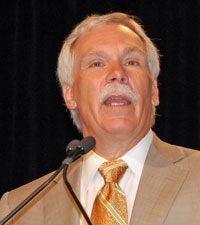A report issued by the the Sierra Club, United Steelworkers, the Blue Green Alliance, Natural Resources Defense Council and Audubon New York says that investment in the biodiesel and ethanol industries, wind energy, and solar power could produce four times the number of jobs as compared to investing that same amount in the petroleum oil sector.
And this article from the New York Times says the number of those jobs being good-paying… at least $16 an hour… could be triple what the petroleum industry offers:
Such jobs are based on the proposed investment of $100 billion over two years, through a cap-and-trade program like those sponsored last year in Congress that would “drive private investments into clean energy and raise public revenue through carbon permit auctions.” And spending $26 billion on retrofitting, for example, could save $5 billion in energy costs a year, for a net savings after five years or so, according to the report.
Robert Pollin, the lead author and a co-director of the Political Economy Research Institute at the University of Massachusetts at Amherst, said many elements of the recommended plan were already in place, in some form.
“There are incentives for retrofits, tax and production credits for wind, solar and geothermal energy, and loan guarantees. I’m talking about ramping up dramatically the scale of these things. Why not do it now, because we know we have to do it sooner or later, and it’s also the most efficient single job program we could come up with.”
The article goes on to point out how one New York firm has hired 15 people who used to be homeless or incarcerated to haul waste restaurant grease to a facility to turn it into biodiesel… renewing energy and people’s lives.



 San Francisco’s proposed biodiesel plant would be situated within on old rendering facility in the Hunter’s Point district owned by Darling International. Under the plan the facility will be renovated to turn grease waste into useable, sustainable energy. Although the agreement has not yet been signed, it is expected that the city will purchase the fuel to cut down on shipments from the Midwest while feeding San Francisco’s biodiesel fleet of 1,500 vehicles.
San Francisco’s proposed biodiesel plant would be situated within on old rendering facility in the Hunter’s Point district owned by Darling International. Under the plan the facility will be renovated to turn grease waste into useable, sustainable energy. Although the agreement has not yet been signed, it is expected that the city will purchase the fuel to cut down on shipments from the Midwest while feeding San Francisco’s biodiesel fleet of 1,500 vehicles. Last week,
Last week, 
 Jobe told the crowd how the NBB was practicing what it preached in making the building as eco-friendly as possible. He also pointed out how the biodiesel industry is doing something to help the environment and America’s pressing energy needs.
Jobe told the crowd how the NBB was practicing what it preached in making the building as eco-friendly as possible. He also pointed out how the biodiesel industry is doing something to help the environment and America’s pressing energy needs.
 During an appearance this week in Kansas City, Schafer said ethanol producers need to prepare for an eventual end to these kinds of incentives. “Because they have been built in today, I think we can’t just shut them off,” Schafer said. “I think it’s important to say here’s the target, we are going to gradually reduce them so that you can adjust your operations to operate without them.”
During an appearance this week in Kansas City, Schafer said ethanol producers need to prepare for an eventual end to these kinds of incentives. “Because they have been built in today, I think we can’t just shut them off,” Schafer said. “I think it’s important to say here’s the target, we are going to gradually reduce them so that you can adjust your operations to operate without them.” The world’s largest ethanol producer is opening two new 65 million gallon per year ethanol production plants this month.
The world’s largest ethanol producer is opening two new 65 million gallon per year ethanol production plants this month. The federal government has granted leases for America’s first offshore wind projects.
The federal government has granted leases for America’s first offshore wind projects.  Biodiesel maker Solazyme, which uses algae as its feedstock for the truly green fuel, has announced that its variety of biodiesel is good enough for the airline industry.
Biodiesel maker Solazyme, which uses algae as its feedstock for the truly green fuel, has announced that its variety of biodiesel is good enough for the airline industry. It appears that someone might have jumped the gun a bit when General Motors released the first pictures of the production version of its much-anticipated electric car, the Chevrolet Volt, earlier today.
It appears that someone might have jumped the gun a bit when General Motors released the first pictures of the production version of its much-anticipated electric car, the Chevrolet Volt, earlier today.